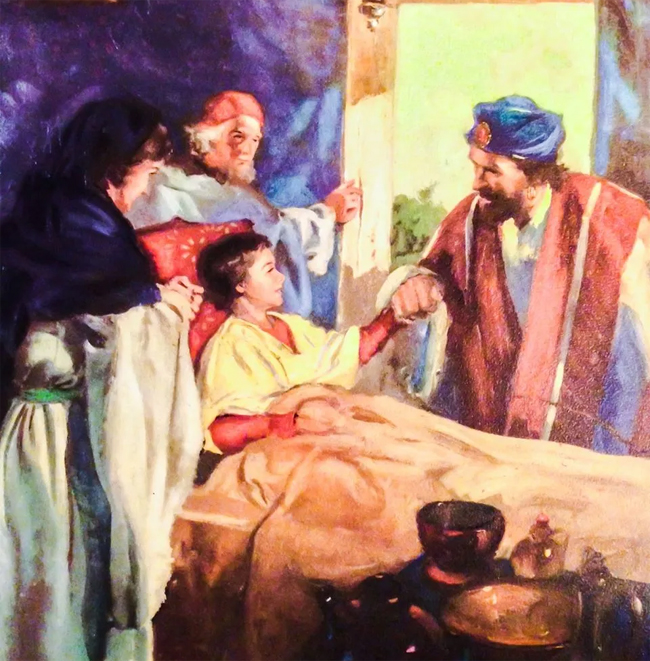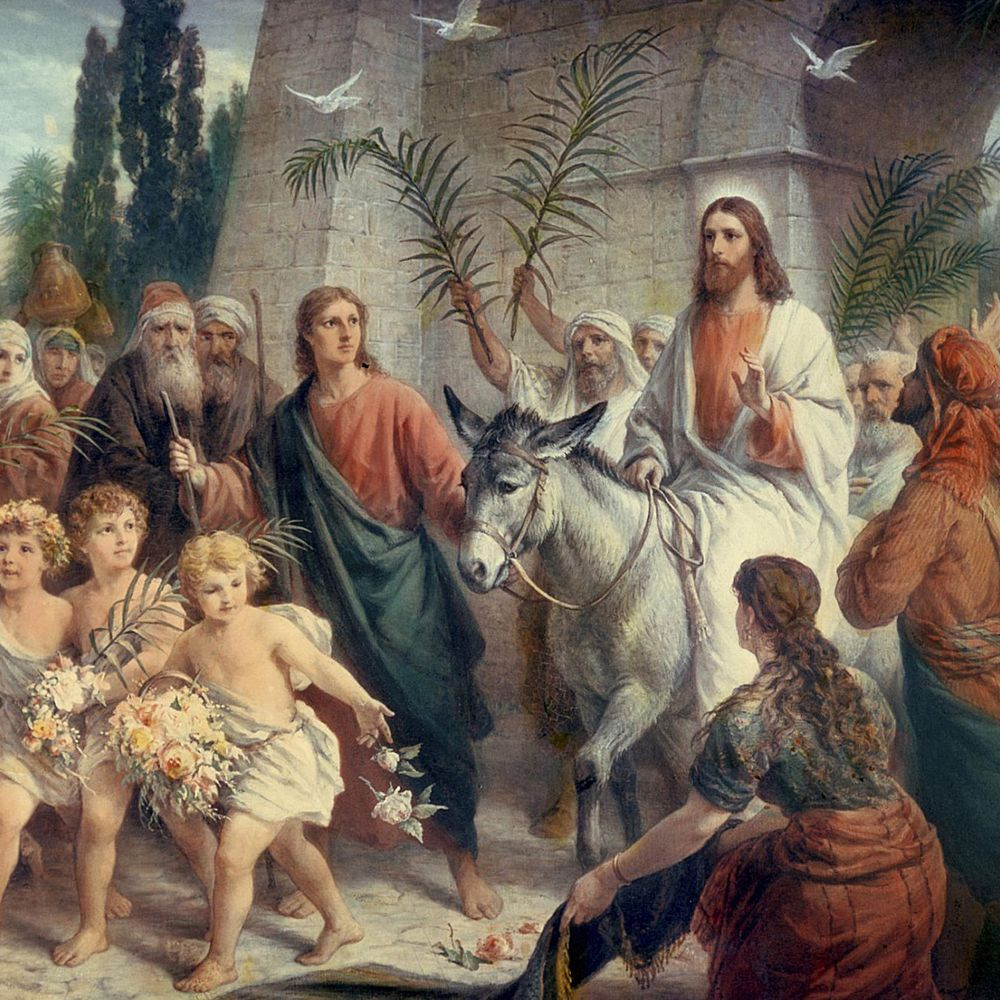Christian Art | Jesus Heals An Official’s Son | Miracles Of Jesus
John 4: 43-54 – Lent Week 4, Monday (King James Audio Bible KJV, Spoken Word)
43 ¶ Now after two days he departed thence, and went into Galilee.
44 For Jesus himself testified, that a prophet hath no honour in his own country.
45 Then when he was come into Galilee, the Galilæans received him, having seen all the things that he did at Jerusalem at the feast: for they also went unto the feast.
46 So Jesus came again into Cana of Galilee, where he made the water wine. And there was a certain nobleman, whose son was sick at Capernaum.
47 When he heard that Jesus was come out of Judæa into Galilee, he went unto him, and besought him that he would come down, and heal his son: for he was at the point of death.
48 Then said Jesus unto him, Except ye see signs and wonders, ye will not believe.
49 The nobleman saith unto him, Sir, come down ere my child die.
50 Jesus saith unto him, Go thy way; thy son liveth. And the man believed the word that Jesus had spoken unto him, and he went his way.
51 And as he was now going down, his servants met him, and told him, saying, Thy son liveth.
52 Then inquired he of them the hour when he began to amend. And they said unto him, Yesterday at the seventh hour the fever left him.
53 So the father knew that it was at the same hour, in the which Jesus said unto him, Thy son liveth: and himself believed, and his whole house.
54 This is again the second miracle that Jesus did, when he was come out of Judæa into Galilee.
The official who approaches Jesus would have been a man of high rank, living in Capernaum, which was a town with a customs post. He comes to Jesus with faith, and yet his faith is, to begin with, imperfect. The official thinks that Jesus must come to his house, a journey of twenty miles, to heal his son. Jesus tells him that, through the faith he has shown, his son is already healed.
When Jesus says, ‘Except ye see signs and wonders, ye will not believe,’ he seems to be speaking to the people of Galilee generally rather than the official. The people are quite ready to flock to Jesus to see the miracles he performs, but are less willing to listen to what he has to say. They desire to be a part of the thrill and the spectacle, rather than to open their hearts to the Word. We are drawn through this saying to listen more closely to Jesus’ teaching and to apply it to our own lives.
The official has, though, travelled a long way and his faith in Jesus’ ability to heal his son is clearly evident, as is his need, which he freely acknowledges. Indeed, he begs Jesus to help him.
Jesus is moved with compassion. He tells the official his son is now healed. It is notable that the official believes what Jesus has said to him before, as he is returning home, his servants meet him to confirm the truth of what Jesus has told him about his son.
It is now that the faith of the official is confirmed. He believes in Jesus, and with him his whole household believes. The official’s journey of faith has become complete.
‘For we know in part, and we prophesy in part. But when that which is perfect is come, then that which is in part shall be done away. When I was a child, I spake as a child, I understood as a child, I thought as a child: but when I became a man, I put away childish things. For now we see through a glass, darkly; but then face to face: now I know in part; but then shall I know even as also I am known.’
King James Audio Bible | Endnotes
Miracles Of Healing And Conversion In The Gospel Of Saint John
John 4:43-54 presents a powerful example of the role of miracles in the Gospel of John, and it also challenges us to reflect on our own faith and our relationship with miracles. This passage highlights the importance of faith as a journey of ongoing conversion, and it invites us to deepen our trust in God even when we do not see signs and wonders.
One of the key themes of the Gospel of John is the role of miracles as signs that point to the identity of Jesus as the Son of God. As John 20:30-31 notes: ‘And many other signs truly did Jesus in the presence of his disciples, which are not written in this book: But these are written, that ye might believe that Jesus is the Christ, the Son of God; and that believing ye might have life through his name.’ Miracles, in the Gospel of John, are not just displays of power, but rather demonstrations of the divine nature of Jesus and his mission on earth.
The miracle in John 4:43-54 is a powerful example of this theme. The official seeks out Jesus in desperation, hoping that he will heal his dying son. This miracle reveals Jesus’ power to heal and his willingness to respond to the plea of a desperate father. But the response of the official is also significant. He had traveled a great distance to seek out Jesus, and his faith was likely fueled by the stories he had heard of Jesus’ previous miracles. Yet, even after witnessing the miracle of his son’s healing, the official’s faith is still in the process of development. As Jesus says: ‘Except ye see signs and wonders, ye will not believe.’
This statement reflects a common human tendency to rely on physical evidence before believing in something. Even though the official came to Jesus in search of a miracle, his faith was not yet fully formed. It is only after witnessing the miracle that he is fully converted to faith in Jesus. This passage challenges us to reflect on our own faith and our relationship with miracles. Do we seek out miracles as a way of reinforcing our faith, or do we already have a deep and abiding trust in God that does not require physical evidence?
The Catholic Church has a rich tradition of understanding miracles as signs of God’s presence and power. The Catechism of the Catholic Church states that ‘miracles are signs that accompany the preaching of the Gospel’ (CCC 548) and that they ‘manifest the presence of the kingdom’ (CCC 547). Miracles are not an end in themselves, but rather point to the deeper reality of God’s presence and power in the world.
Protestant theologians have offered insights into the role of miracles in the Christian faith. The Protestant reformer John Calvin, for example, saw miracles as a sign of God’s sovereign power and as a way of validating the message of the Gospel. He wrote that ‘miracles were performed for the purpose of confirming the doctrine which God had delivered’ (Institutes of the Christian Religion, 2.14.2).
The Protestant pastor and theologian John Piper has written extensively on the role of miracles in the Christian faith. He writes that ‘miracles are not meant to create faith, but to confirm it’ and that ‘faith comes by hearing, and hearing by the word of Christ’ (Romans 10:17). Miracles, in Piper’s view, are a sign of God’s power and grace, but they are not the foundation of faith.
In the context of Lent, the story of the official in John 4:43-54 offers a powerful reminder that even those who seek out miracles may still be in need of further conversion. Lent is a time for reflection and repentance, as we seek to deepen our faith and grow closer to God. As we reflect on the role of miracles in our faith, we must also remember that our relationship with God is an ongoing journey of conversion. Just as the official in John 4:43-54 had to see the miracle of his son’s healing to fully believe in Jesus, we too may need ongoing signs and wonders to deepen our faith.
However, as we deepen our trust in God, we must also be mindful of the danger of relying too much on physical evidence. The passage in John 4 reminds us that faith cannot be reduced to a simple equation of evidence and belief. Rather, faith is a complex journey that requires us to continually deepen our relationship with God.
As we journey through Lent, we must be open to the work of the Holy Spirit in our lives. We must allow God to transform us, even if that transformation is uncomfortable or difficult. Lent is a time to recommit ourselves to our faith and to deepen our trust in God, even if we do not always see signs and wonders.








